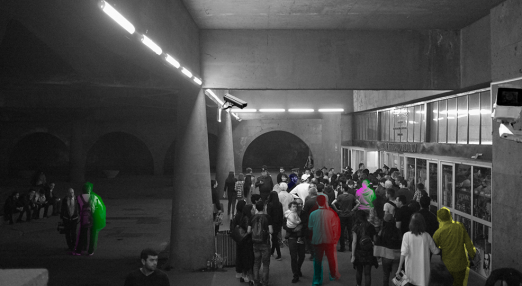Big brother at the Prague airport. The state refuses to explain how the biometric camera system works
When Václav Mach, collaborator of the Czech digital-legal organization, an EDRi member, Iuridicum Remedium (IuRe) and law student at the University of Olomouc, asked the state for more detailed information on the use of smart biometric cameras at Prague's Václav Havel Airport, he obtained just general phrases. "They kept secret what they could. Their non-transparency doesn’t add to their credibility,“ he says in an interview with HlídacíPes.org. The article below is a summary of the more extensive interview, translated from Czech into English by EDRi member IuRe.
Filter resources
-

Big brother at the Prague airport. The state refuses to explain how the biometric camera system works
When Václav Mach, collaborator of the Czech digital-legal organization, an EDRi member, Iuridicum Remedium (IuRe) and law student at the University of Olomouc, asked the state for more detailed information on the use of smart biometric cameras at Prague's Václav Havel Airport, he obtained just general phrases. "They kept secret what they could. Their non-transparency doesn’t add to their credibility,“ he says in an interview with HlídacíPes.org. The article below is a summary of the more extensive interview, translated from Czech into English by EDRi member IuRe.
Read more
-

EDRi urges Portugal government to oppose proposed video surveillance law
EDRi member and Reclaim Your Face lead organisation D3 (Defesa Dos Direitos Digitais) are raising awareness of how the Portuguese government’s new proposed video surveillance and facial recognition law – which Ministers are trying to rush through the Parliament - amounts to illiberal biometric mass surveillance. It also endangers the very foundations of democracy on which the Republic of Portugal rests.
Read more
-

Facebook deleting facial recognition: Five reasons to take it with a pinch of salt
Voluntary self-regulation from tech giants is superficial and no replacement for actual legislation
Read more
-

Human Rights Groups Submit Complaint to European Ombudsman Calling for Investigation into EU Surveillance Aid
Privacy International (PI), together with 5 other human rights groups, has submitted a complaint to the European Ombudsman calling for an investigation into EU surveillance aid to non-EU countries.
Read more
-

MEPs poised to vote blank cheque for Europol using AI tools
This week, MEPs recognised the dangers of certain uses of Artificial Intelligence (AI) in criminal justice. A strong majority rallied around the landmark AI in criminal matters report by the European Parliament's Civil Liberties, Justice and Home Affairs (LIBE) committee, which opposes AI that 'predicts' criminal behaviour and calls for a ban on biometric surveillance.
Read more
-

Celebrating a strong European Parliament stance on AI in law enforcement
On 5 October, following a significant push from across civil society, the European Parliament voted to adopt an important new report on Artificial intelligence in criminal law and its use by the police and judicial authorities in criminal matters by a promising majority of 377 votes in favour, to 248 against. This followed a tense vote earlier as a majority of MEPs opposed all four attempts from the European People's Party (EPP) to remove key fundamental rights provisions from the report.
Read more
-

EDRi and 41 human rights organisations call on the European Parliament to reject amendments to AI and criminal law report
EDRi and 41 human rights organisations* call on the members of the European Parliament to vote against the new amendments, which enable discriminatory predictive policing and biometric mass surveillance.
Read more
-

Building a coalition for Digital Dignity
In 2020 EDRi started to build the ‘Digital Dignity Coalition’, a group of organisations and activists active at the EU level dedicated to upholding rights in digital spaces and resisting harmful uses of technology. We’ve been organising to understand and resist how technological practices differentiate, target and experiment on communities at the margins - this article sets out what we’ve done so far.
Read more
-

Biometric ‘permission to travel’ scheme in Borders Bill will affect tens of millions of people
The attack on the asylum system proposed by the UK government in the Nationality and Borders Bill has provoked outrage. However, the Bill also includes proposals to introduce an electronic 'permission to travel' scheme that would involve gathering biometric and other data from tens of millions of people. The UK Parliament's Joint Committee on Human Rights (JCHR) is conducting legislative scrutiny on the Bill. EDRi's member Statewatch submitted written observations to the inquiry last week.
Read more
-

Eurodac: Council seeks swift agreement on expanded migrant biometric database
The Slovenian Presidency of the Council is planning to accelerate negotiations on a vast expansion of the Eurodac database, which will hold sensitive data on millions of asylum seekers and migrants in an irregular situation, by 'delinking' the proposed rules from other EU asylum and migration laws under discussion.
Read more
-

Digital Dignity Document Pool
Digital technologies can have a profound effect on our societies, but sufficient attention is rarely given to how certain applications differentiate between, target and experiment on communities at the margins. This document pool gathers resources for those that are interested in learning about and contesting the harms to dignity and equality that arise from uses of technology and data.
Read more
-

Intensified surveillance at EU borders: EURODAC reform needs a radical policy shift
In an open letter addressed to the European Parliament Civil Liberties, Justice and Home Affairs Committee, 34 organisations protecting the rights of people on the move, children and digital rights including European Digital Rights (EDRi) urge policymakers to radically change the direction of the EURODAC reform – the European Union (EU) database storing asylum seekers’ and migrants’ personal data - in order to respect fundamental rights and international law.
Read more
